How Brazilians 4x their income by working for tech startups
By Margot Boyer Dry●8 min. read●Oct 9, 2024
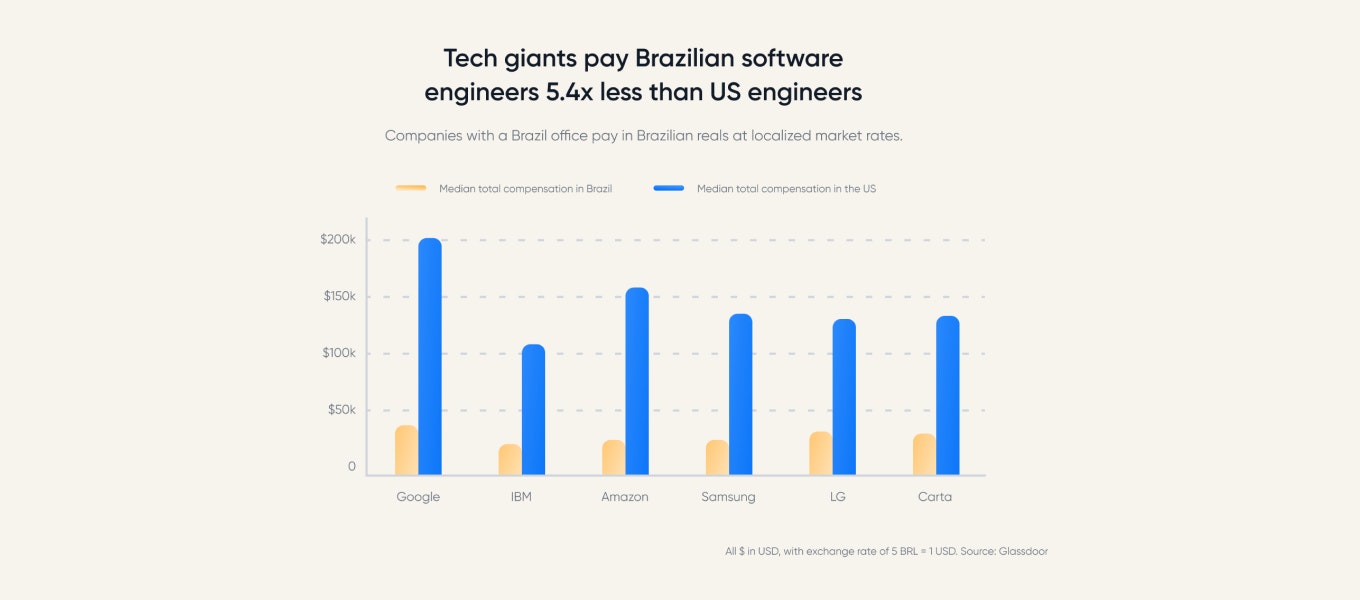
If you’re a Brazilian engineer getting paid in Brazilian reals, you can 4x your income by working for an American company.
Remote startups have started hiring remote workers overseas, employing them as contractors, and paying them close to US salaries.
This series of blog posts will show you exactly what to do — which companies offer competitive salaries, why they do this, how to interview, and how to get paid.
We know about the topic because Tremendous is one of those companies. Our hiring strategy involves identifying top talent outside of the US and paying them at near-US rates. To write this article, we interviewed our founders, hiring managers, and staff who are based in Brazil.
We hope that by writing this, top talent in Brazil will switch over to jobs that will pay them closer to what they are worth.
Table of contents
Let’s talk salaries
Quite simply, Americans get paid more than Brazilians for the same work. Median total compensation ranges from $111k to $203k for software engineers living in the United States and working at Google, IBM, Amazon, Samsung, LG, or Carta. That averages to roughly $145k.
For software engineers employed by the same companies but located in Brazil, compensation drops by 5.4x on average to roughly $27k.
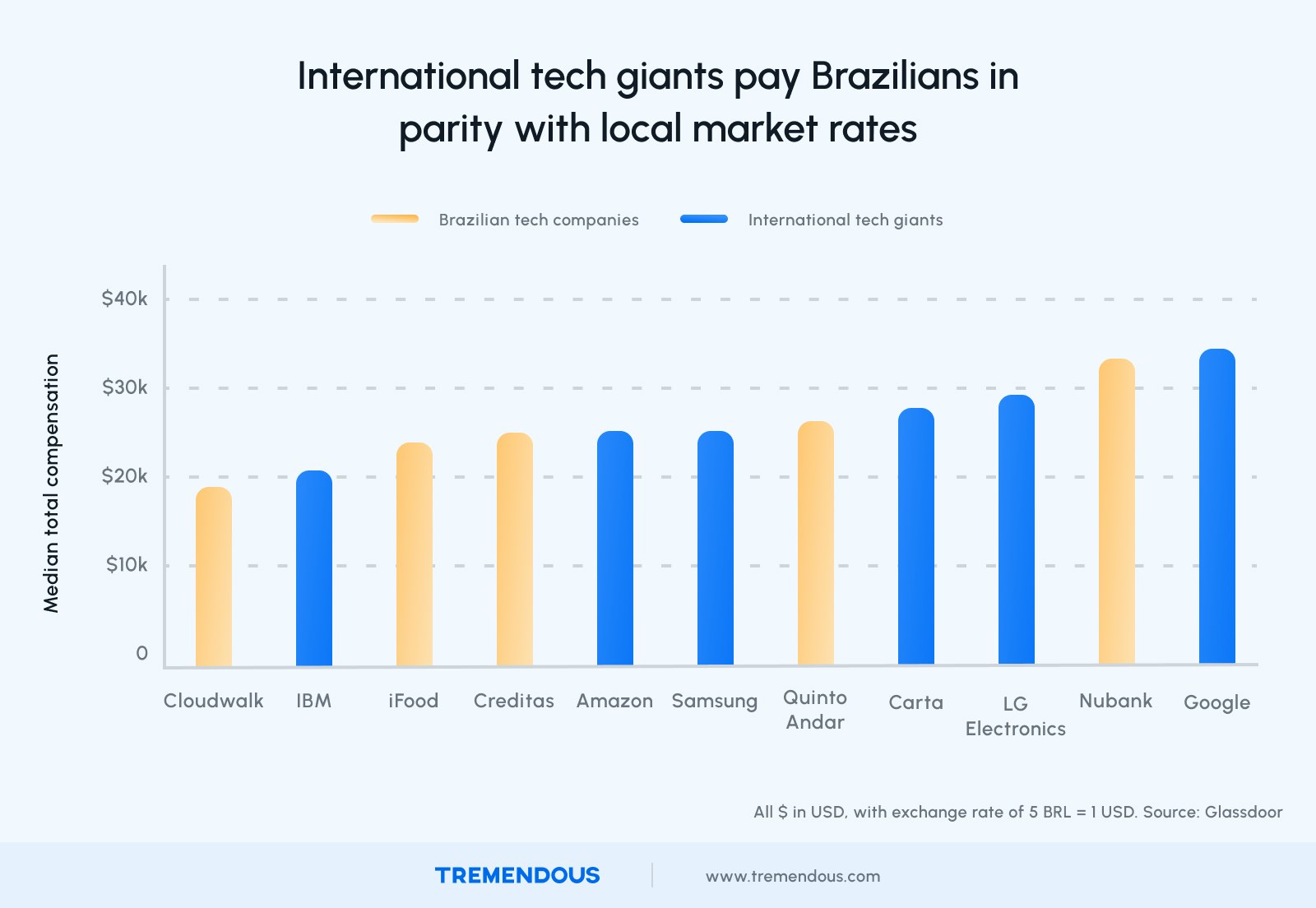
These tech giants are paying, more or less, in parity with Brazilian market rates. The average software engineer at Nubank, QuintoAndar, Creditas, Cloudwalk, or iFood earns $19k to $31k a year on average. When compared against the group of tech giants, compensation starts looking pretty similar.
The arbitrage opportunity
There is a host of tech startups hiring software engineers, paying in US dollars, and offering compensation rates on par with a US-based employee of a tech giant.
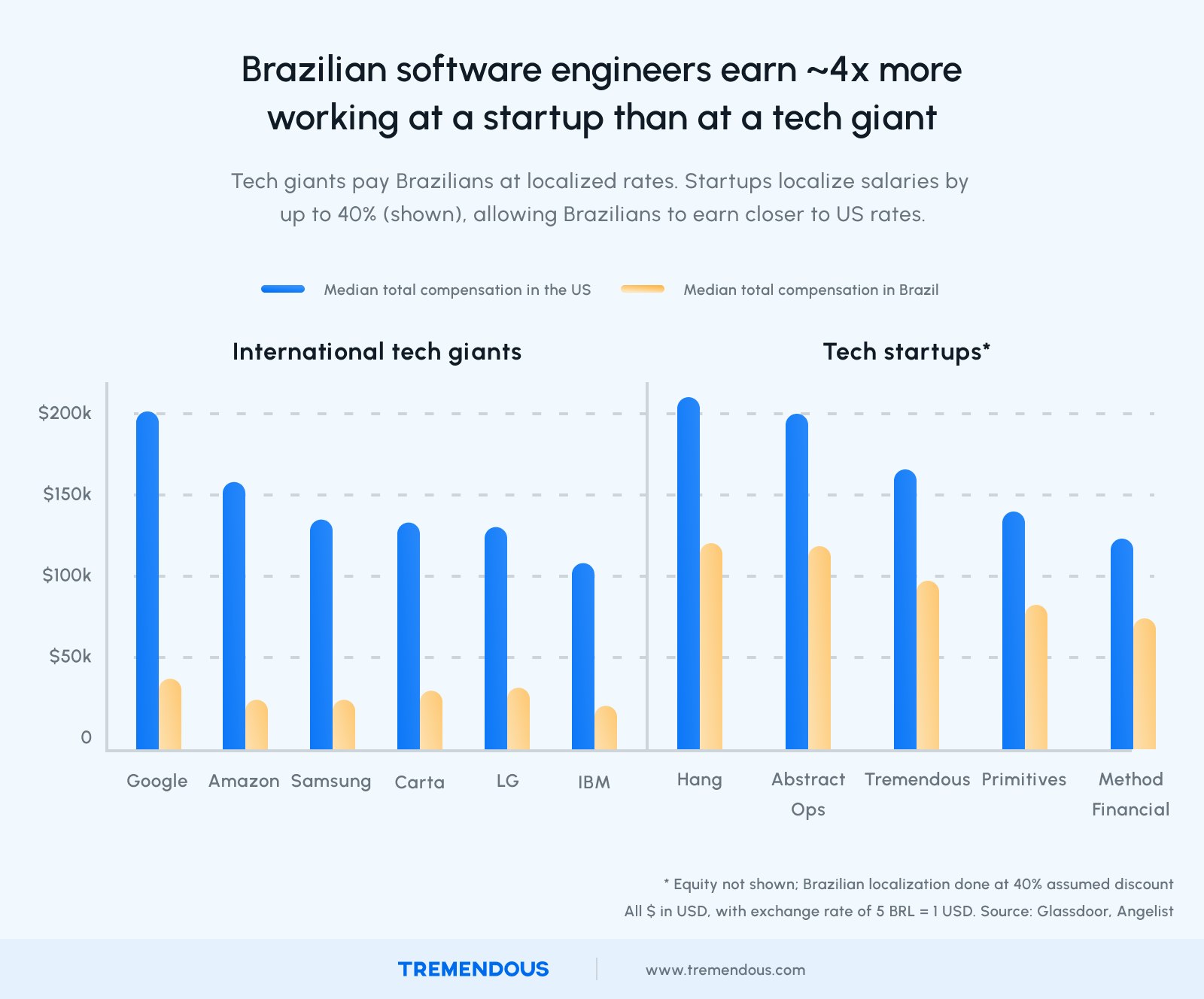
Startups tend to hire senior engineers, which drives higher compensation. It’s also true that companies will localize salaries, which can lower the listed comp rates by up to 40%.
Even accounting for localized salaries, Brazilians can earn:
3-4x higher base compensation than they would working for a Brazilian company or a tech giant,
Up to nearly 6x more working remote for a tech startup than IBM, and
$0.71 for every dollar earned by an American on average.
Don’t forget equity
And that’s without even considering equity. American tech companies often offer stock options or shares as a part of their compensation. For the roles reviewed for this article, stock options grants ranged from between .1% to 1.5% of the company.
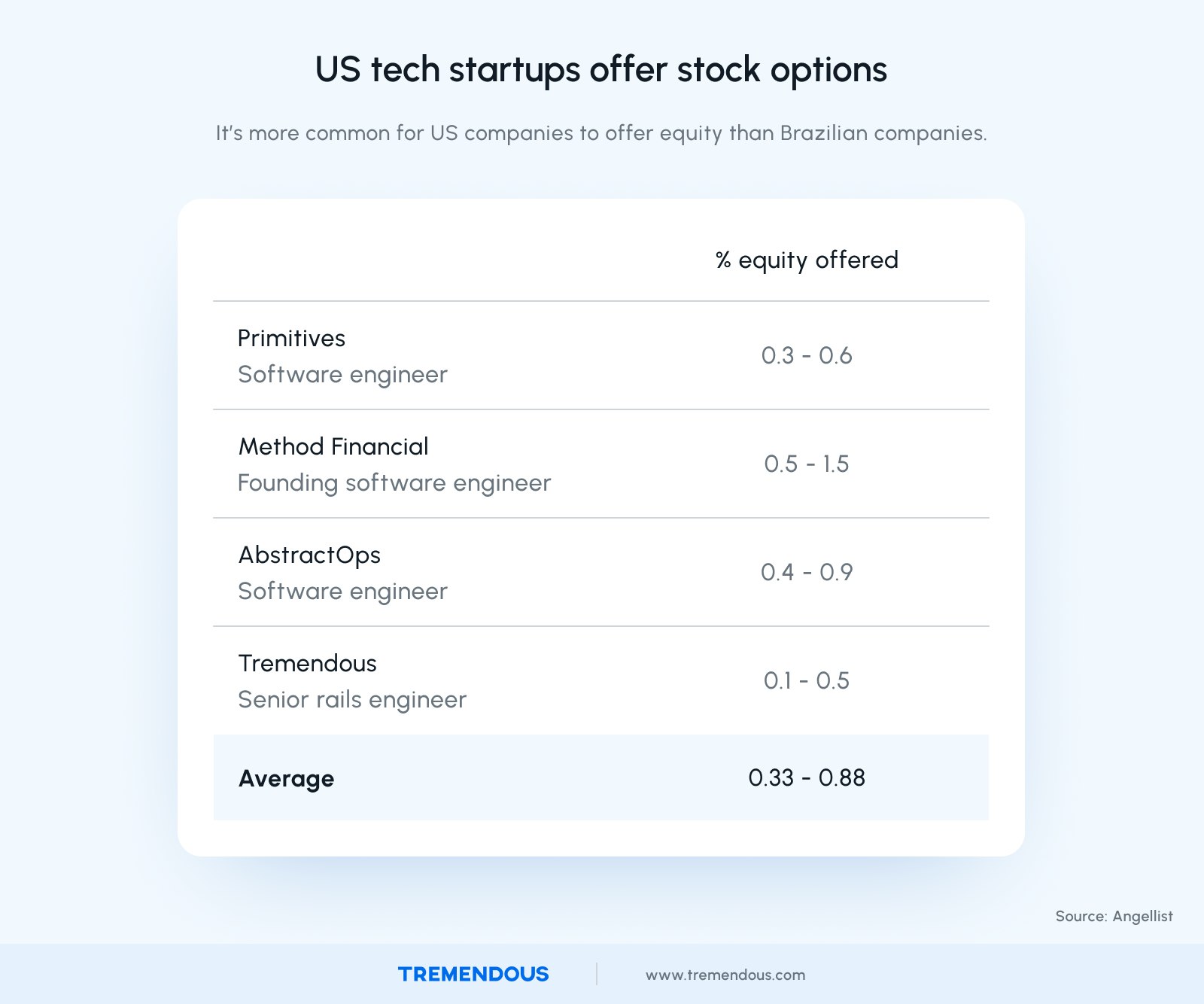
Offering stock is less common among Brazilian enterprises. According to a survey by Rest of World, US companies are five times as likely as Latin American companies to offer stock options to employees. And that part-ownership in the company can become quite valuable if the company does well and it either sells or goes public. Early employees at successful companies have become millionaires this way.
Equity in a startup is a complex topic. We’re going to oversimplify it for the sake of explanation. (You can find a more nuanced explainer here.)
There are two important variables:
The percentage of the company you own, and
The value of the company.
If you are granted 10,000 options out of 10 million outstanding shares, you will own 0.1% of the company when they fully vest. If the company is bought for $2 billion, those shares are worth $2 million.
Equity, however, has inherent drawbacks and uncertainties. First, it’s difficult to predict which companies’ stock will pay off, and when that might happen. The company needs a liquidity event (such as being acquired or going public) for your shares to be worth actual money.
And to gain access to shares — for them to “vest” — you may have to stick around a while. Most stock options begin vesting after the first year of employment, and vest fully over the course of four years. And if you “exercise” your options — that is, buy shares from the company at their valuation when the options were granted — they may come with tax liabilities.
When a tech company has a Brazilian office
Working as an employee for a US company with a Brazilian entity, you’ll be paid in Brazilian real (that generally means you’ll collect a lower salary).
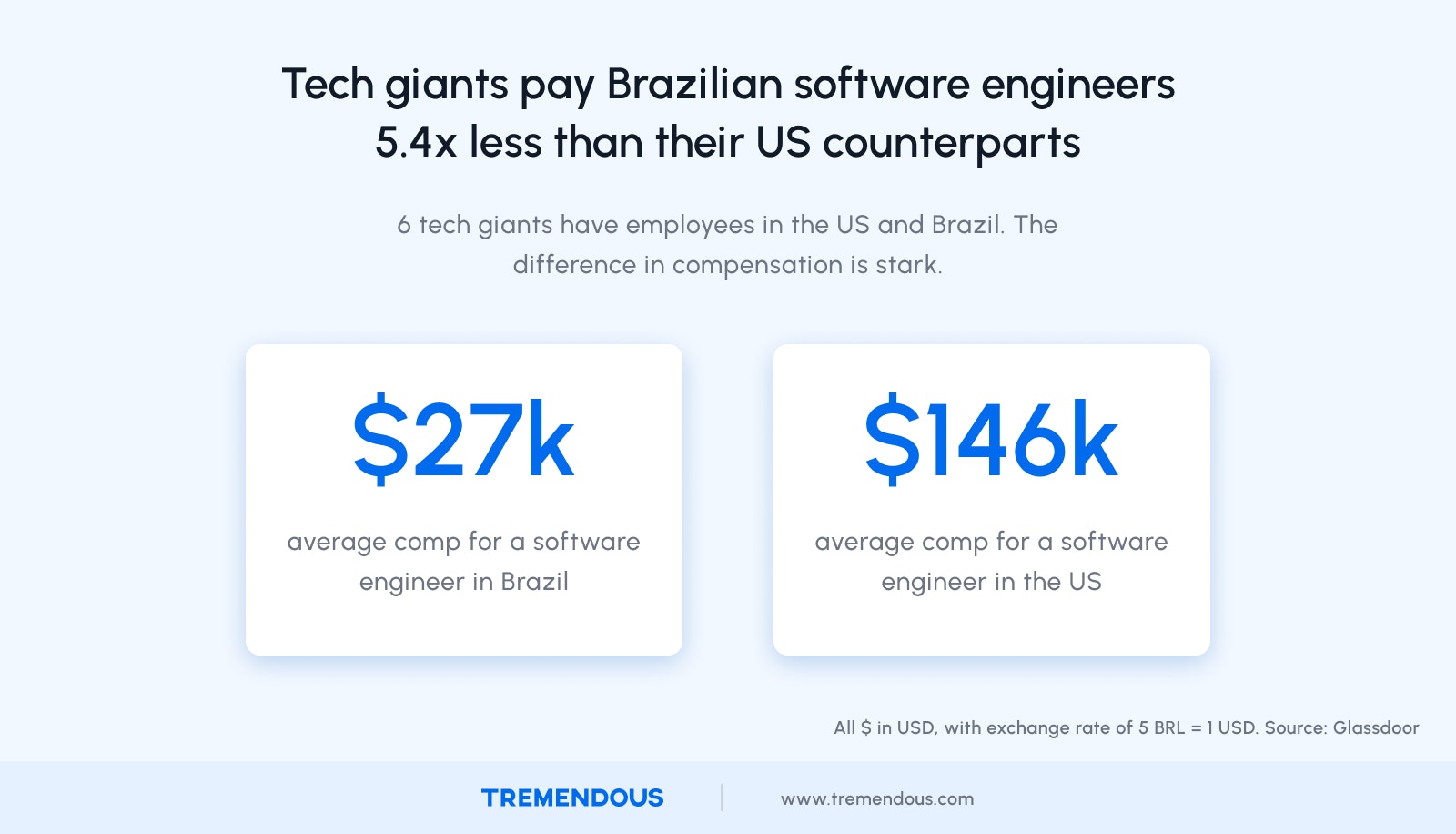
But you will have the protections of Brazilian labor law.
While the pay and equity upside at tech startups may be alluring, Brazilian labor laws offer benefits that US companies don’t.
Brazilian law requires that employees get a month's bonus at the end of the year (called the “13th month salary”).
Employees in Brazil almost always get meal expenses worth up to $300 per month, or R$1500 (the amount varies based on cost of living in each city; in São Paulo, it’s R$30–50 per day)
They typically get 30 days of paid vacation (vs. the 15 days at US companies).
Brazilian companies will cover private healthcare (on top of Brazil’s public universal healthcare) for both employees and their dependents.
And severance at Brazilian companies is particularly high: If an employee in Brazil is let go, they'll typically earn a month's salary for every year of service; American companies only offer two weeks total as a standard.
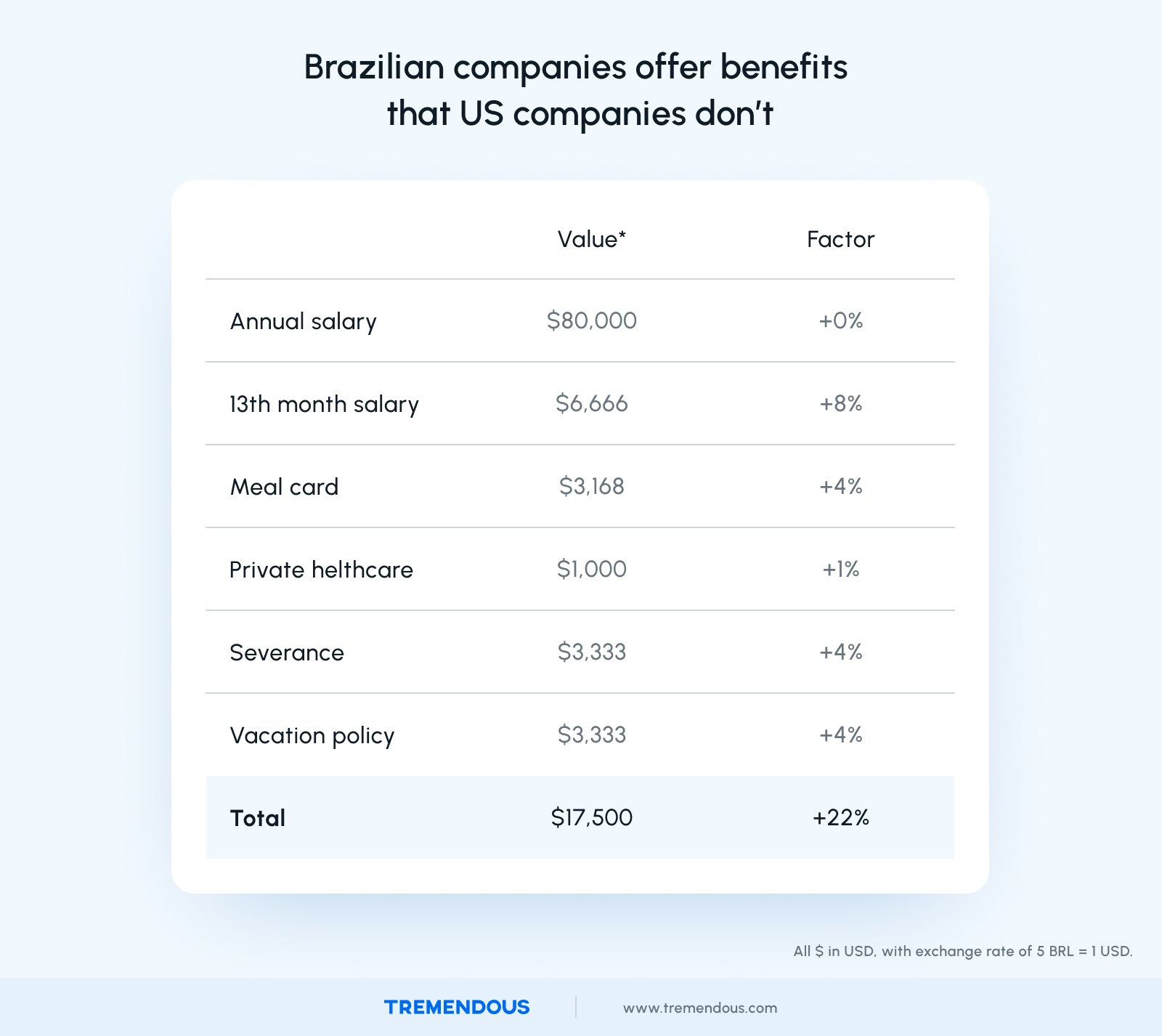
In addition, certain kinds of employees in Brazil get special protections:
People who are pregnant, ill, or disabled,
Union leaders, and
People who are about to retire.
Pregnant employees, for example, have their jobs protected from the date of conception to five months after they give birth.
All those benefits add up to push total compensation for a Brazilian full-time employee up to 22% above the base salary listed on their offer letter.
Working as a contractor for a tech startup
If you want to capitalize on the salary arbitrage opportunity, you must be a contractor, which means it’s important to understand what that entails.
Being a contractor has a few risks and nuances worth understanding.
Exchange rates
Let’s start with exchange rates. The value of currencies fluctuates constantly, but for the sake of simplicity, let’s peg 1 US dollar to be worth 5 Brazilian reals. That means a $150,000 salary in USD = R$750,000.
Since July 2021 (about a year ago), that exchange rate has fluctuated to as high as R$5.75 per US dollar and as low as R$4 per US dollar. Considering you’ll typically be paid twice monthly, the exchange rate could have a real impact on your take home pay.
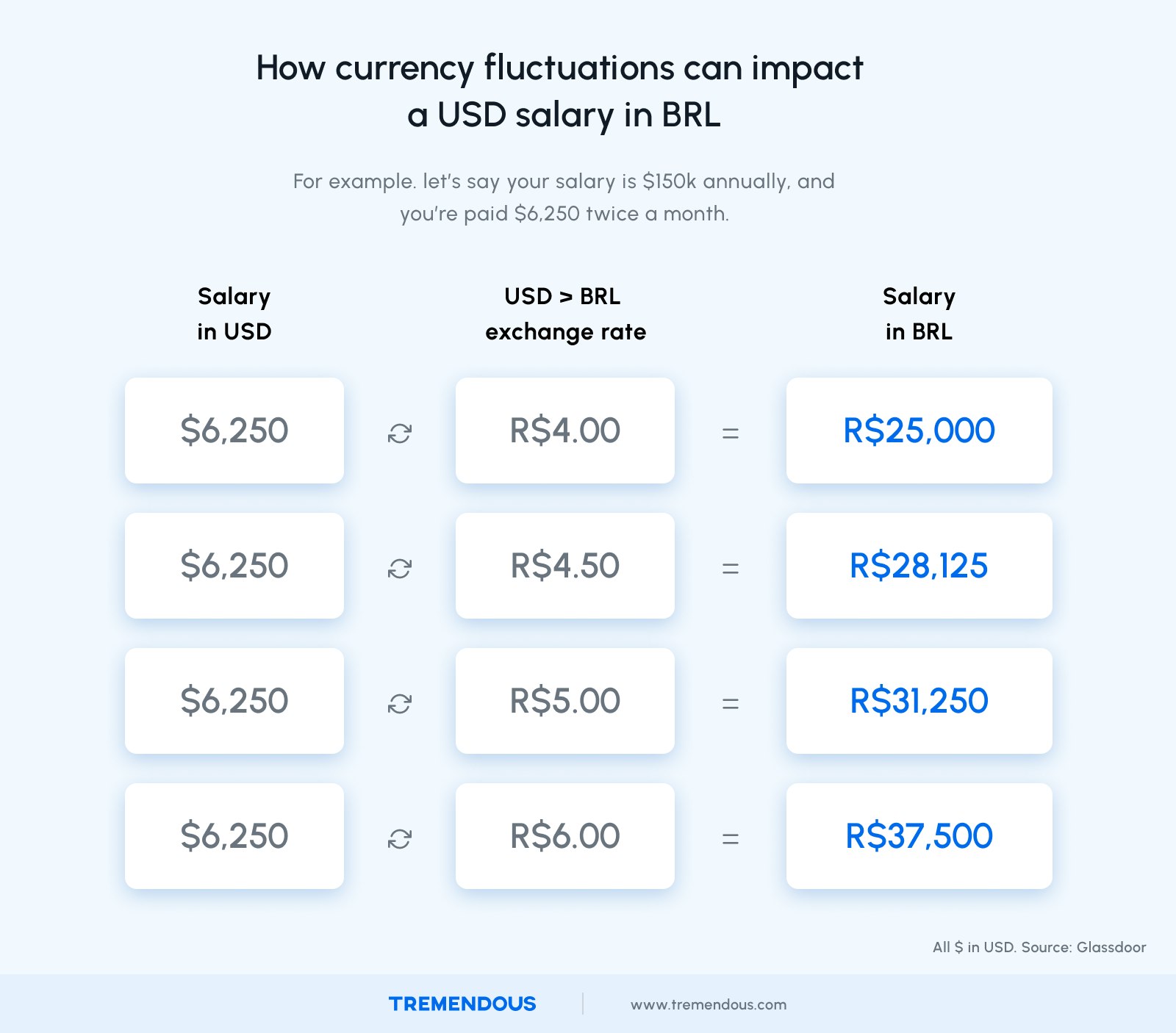
However, even with currency fluctuations, you should still earn significantly more money working for an American tech company.
Setting up an LLC
Another logistical hoop to jump through as a contractor is that you’ll likely need to set up your own LLC.
The good news? An LLC secures you a much lower tax rate — you’ll pay about a 15% corporate tax rate rather than an income tax rate up to 27.5%. But that benefit comes with the work (hours!) and cost (which might be around R$400/month) of setting up the legal entity with an accountant.
(We’ll cover how to do this in a future article.)
On your own to find benefits
Working as a US contractor, you also won’t have the protections of Brazilian labor law, so you’ll be personally responsible for:
Buying your own private health insurance,
Filing taxes (and likely working with an accountant to do so),
Opening a bank account for your LLC,
Setting aside retirement funds, and
Arranging for your own vacation time.
Company-sponsored benefits
But you may get other benefits that US companies sometimes offer:
A learning budget,
Company-sponsored travel for offsites, or
A work-from-home setup allowance.
It entirely depends on whether or not the company affords foreign contractors the same benefits as domestic employees.
Weighing your options
There are many variables to weigh when deciding whether to work remotely for a tech startup. One way to make your options clear? Make a spreadsheet.
And if the spreadsheet tells you one thing and your heart says another? Then you can feel even more confident in your decision.
In conclusion, know your tradeoffs and make a confident decision.
Getting paid in USD and as a contractor comes with logistical pain points, but if you’re OK with those sacrifices, you could quadruple your salary or more.
On that note, if you’d like to try your hand at a US company, Tremendous employs several Brazilian engineers already and we’re hiring. We’re also here to answer your questions about working from Brazil. Take a look at our open positions here — we’d love to meet you.
--------
Methodology
Tremendous reviewed compensation data from Glassdoor for the average software engineer (agnostic of years of experience) at:
5 Brazilian tech companies (Nubank, QuintoAndar, Creditas, Cloudwalk, and iFood),
6 tech giants with U.S. employees (Google, IBM, Amazon, Samsung, LG Electronics, and Carta), and
The Brazilian contingent of the same 6 tech giants (Google, IBM, Amazon, Samsung, LG Electronics, and Carta)
For the tech giants, we pulled the median compensation for a US-based employee and for a Brazil-based employee. Then we compared those compensation rates against what a software engineer might earn from a tech startup hiring remote engineers internationally.
For remote tech jobs, we found five tech startups hiring engineers anywhere in the Americas via Angel List. These companies include Primitives, Method Financial, AbstratctOps, Hang, and Tremendous. Each company also listed their compensation ranges for their respective open positions. To account for localization, we assumed a 40% discount to the median listed salary. 40% is the high end of the commonly used 20% to 40% range.
All calculations and links to compensation data can be found here.
Updated October 9, 2024